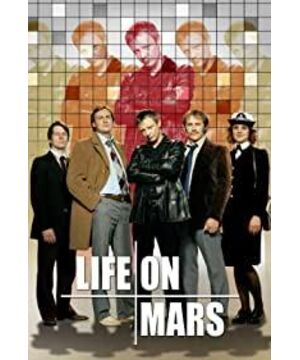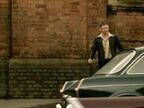Because Life on Mars is indeed a relatively good work in terms of ratings and critics in the past two years There are only 16 episodes in two seasons, and the finale will be broadcast in the UK within a week, so there is no worries, so this curiosity is enough to prompt me to try it.
Then I downloaded and watched the first season within two days. After emptying the hard drive, I stared at the screen for a while, and then said to myself, damn, I shouldn't delete it right away, I should watch it again... Saying that the movie/novel/anime/TV episode that feels the best isn't necessarily the one that feels the best, forgetting that there are times when the two do overlap.
The hero Sam himself said the old saying "God is in the details", and this is indeed a show that is entirely made of beautiful details. I didn't know that the details were perfect to a certain extent but it turned out to be able to sublimate the essence. Of course, the story itself also reveals to us the power of details. Sam went from Manchester in 2006 to Manchester in 1973 (time travel? coma or hallucinations in madness?), the only things that have changed in life are some details, but he feels like he has come to another planet. Because it is 1973, there is great pop music, and the rhythm, lyrics and pictures in Life on Mars have achieved a seamless effect. I used to think that the soundtrack in British and American TV series was at the end or the climax. Put on a song that's melodious but unremarkable, with a word or two missing to point out the protagonist's mood, and now I know how I've underestimated the power of music in weaving dreams. And the world in 1973, the rows of brown low houses that have been demolished today have an extraordinarily gritty real touch, orange ice cream trucks parked on street corners, the sky has a touch of orange, and then Sam's In a dream, in 1973, when I was four years old, the silver buckles on my shoes were filled with green eyes before the rain. The title of the episode is obvious at a glance, it is from the song of the same name by David Bowie. The first time we heard the song was the first time Sam woke up in 1973, a 360-degree pan shot across a tan construction site and a silver-grey sky like uncleaned glass windows, and I felt like I had It's been a long time since I watched it like this; the second time was the last episode of season one, and Sam watched out the window as his teenage parents danced together for the last time, half-guessing the end of the story, when the same song suddenly reappeared. Tear-jerking power. This is first and foremost a show about nostalgia. Was Britain in 1973 really so full of violence, discrimination and injustice? Does it really have such a touching warmth and innocence at the same time? The past is the past in our memory, and our memory is mixed with too many emotions.
Because I have only watched the first season of Life on Mars, and whether the story is intriguing or not depends to a considerable extent on the final burden, so here I will only talk about Mr. Simm, the protagonist of the whole play.
This is an era when the protagonist is unpopular, and yet a story, especially those in the sci-fi/fantasy/fantasy genre, still needs the charisma of the protagonist to give them credibility, and whether we choose to underestimate the importance of the protagonist doesn't change that. It doesn't seem to be a matter of acting or beauty (I've seen protagonists with beauty but no acting succeed in propping up a story, and I've seen actors with acting but no beauty fail), it's more about actors A question of presence and charisma. And Sam Tyler in Life on Mars is a successful protagonist in that sense. A police detective living in 2006 wakes up after a car accident and finds himself back in 1973, and it's not the least ridiculous plot even in the world of TV. Getting us, the audience, to buy it is the first step.
Because of the implication that the entire world of 1973 may have been a hallucination of Sam in a coma, we don't escape his presence for a second as he appears in every shot of the show. Life on Mars is essentially an Alice in Wonderland story, that is to say, the protagonist is the only "boring" character surrounded by a colorful cast of supporting characters. This character refuses to buy necessities such as pajamas because he doesn't believe the world around him is real, but actually works overtime in a world he doesn't think exists. Once he was kidnapped by criminals, no matter how hard he tried to remember, the happiest moment in his life was actually hearing the whistle of his father, who he thought he would not be able to come back, from outside the door on his fourth birthday. He doesn't make choices that seem cool to us, and he doesn't have much of his share of aphorisms. He has the potential to tire us out of being everywhere, degenerate into a Mary Sue type of character (let's recall all those original time travel texts), and even preach to other characters about humanity and justice. Maintaining our patience in this situation is the second step.
We do not escape the presence of the protagonist for a second, just as he does not escape our eyes for a second. Sam suspects, like us, that the world around him is just a hallucination of his subconscious, and that the real him may die at any time, but then again, he can't be 100% sure. The only thing that has reached 100% is his identity crisis. Therefore, this role requires opening wounds all the time, maintaining emotional tension, sensitivity and honesty without slack, and there are many dramas to vent emotions. If actors ever fall back on melodrama tropes, then our eyes are sharp (laughs). This is the third step.
Life on Mars is a show with an even split of male and female audiences. It's easy to imagine that the second male protagonist in the play, the protagonist's police boss Gene in 1973, is like a sheriff who came out of a Western movie, and will gain everyone's favor at the same time. And a character who on average has a crying scene in Chichi-how to look at how tormented his heart day after year-or the male protagonist-it's hard to say. (Sammy boy, you're such a crybaby, you cry when the criminal points a gun at your temple, like something. Strange to say, though, despite all the crying scenes, I never felt the character lacked masculinity Yes. And I've used the excuse of crying and being spineless to get rid of male characters in anime/tv series far more than once.) How can we ensure that the characters are not weakened? This is the fourth step.
The most charismatic character in the story is undoubtedly Gene rather than Sam, but because of the narrative angle of the story, we always see Gene as Sam sees it. In fact, a strong character like Gene would be unimaginable without the equally fierce Sam as a balance. Having said that, Mr. Simm didn't pass the fifth step, and there are still many people who complained why he was nominated for the British Academy Award for Best Actor in Television, and not Mr. Philip Glenister, who played Gene, is proof. The role of Gene is undoubtedly fresher and more lovable and higher than life, but it does not have similar requirements for the depth and intensity of the performance. By contrast, Mr. Simm must have at least a few hundred different expressions of pain with varying degrees of nuance - I think I'm used to the pain of characters in film and television productions being more of a result than a process, and the actor It should be satisfying to be able to express pain alive, how can we ask for pain to be layered in shades and shades like the petals of a rose. This is a full 16 episodes of gorgeous dazzling skills, just dressed in plain clothes. Just because a person walks a tightrope in ordinary clothes rather than circus costumes does not negate the nature of his performance. However, we are indeed in an era when the protagonist is unpopular. It is our nature to fall in love when we meet those who are shallow and near.
Now it's time to talk about the details, lol.
Mr. Simm was as thin as I remembered, but a black leather jacket, flared trousers, Cuban high-heeled shoes, and an open-neck shirt with a large neck and collarbone from the 1970s would have been perfect for him. (Men's fashion in the 1970s was a stark contrast to the macho men of that era.) Every time he smiled, the sink still appeared on his right cheek, but there was nothing in his smile. Where people are chilling, on the contrary, even when he is nervously laughing, he laughs in a harmless and clever way. And when he decides to put on a more formal, wholehearted smile, that face jumps from winter twilight in February to spring in May. As I have already said, it is our nature to fall in love with those who are near. My ignorance probably lies in looking at Sam's smile...and Gene's pouting expression is cute, but after all, he's an uncle with a beer belly.
Compared with the standardized eyelashes, teeth, smiles, muscles of American TV, sometimes British TV is such a simple and refreshing world. Even when a male protagonist smiles, every time you feel that the smile is the first time you see it, not a dozen dollars that can be assembled, sold, and resold. You no longer feel like you might be the only person in the whole world outside your door who doesn't have the looks and body of a model for 40 minutes of TV. When a couple of the main male characters rush out in unbelievably ugly '70s swimsuits (to hunt down the suspect who ran away from the swimming pool, of course), you know it's not a TV down for ratings The screenwriter was cruel to add this plot, because those pale, flabby bodies of varying weight and thinness have no aesthetic or monetary value-although they do make the scene comedic. The grass on the banks of the canal smelled of wet grass, and Sam was wearing a lifeguard's tank top and shorts, the St. Christopher's plaque dangling on his chest. Always the one who pulls out the badge first, he mixes up the 70s and 21st century versions of "You have the right to be silent, but everything you say will be in court", Gene listens. Getting impatient, he yelled "you're caught" in the ear of the hapless prisoner. Several people relaxed, Sam stared at Gene's scary orange-red swimming trunks under the beer belly, with a smile in his eyes, which was the only piece of clothing on Gene's body. "What are you looking at, Sammy boy? There's no badge under here!" Sam fell on the grass, laughing. Pale but cheerful smile, like in the MV of a slightly psychedelic song, that kind of smile that is often set against the background of green grass, which makes people feel like a dream.
What did I just write? Unjustly wronged, I actually don't like the slash of Life on Mars... Although even the Daily Mail said that the theme of the show is the love story of these two police detectives. It's a retro-inspired show that pays a lot of homage to '70s westerns and gangster movies, especially with its handling of the ambiguity between the two leading men. Presumably many doujinshi are like me, full of frustration with the ambiguity between the two protagonists of the films of that era. This kind of ambiguity that never crosses a certain line but seems to have virtually canceled all boundaries is no longer available today. The most successful retro work in this regard is probably L.A. Confidential ten years ago, Life on Mars and It, too, is a dream combination between a cop who only trusts his fists and a bookish cop. But the writers of Life on Mars were too conspicuous about what they were doing, and they told me not to take the bait. All those synchronised punches with the same heart, the punches, shoves and verbal violence that every episode has to offer, Gene Jiji saves beauty from Sam's hero who is always being pointed at guns in the first half of season 1 (It was reversed later, and Gene was rescued), the various aliases Gene gave to Sam (Gladice, Dorothy, Marjorie, etc., etc., Sammy boy is still the most polite). The script is a little clever when Sam scolds Gene for saying, "You homophobic guy with an unhealthy obsession with masculinity..." and Gene shoots back, "You said it like it was a bad thing." It's overdone. Gene was definitely homophobic, and even Sam was overly fond of his masculinity, and it was easier to imagine how he would sympathetically and apologetically reject same-sex offers than he would accept. Although, the chemistry between Sam and Gene cannot but be said to be at least better than the chemistry between him and the girl-next-door heroine Annie. Annie glanced at the black leather jacket hanging on the wall and then at the splendid girly heart of the Roxy music concert advertisement in the newspaper. Of course, I understood it very well, but the chemical effect can be said to be basically non-existent. (Although I like Annie's character, I can't help but say that Annie's neck looks thicker and stronger than Sam's, which is unlikely to help.) We see the right men and women on TV shows on weekdays The number of roles is actually very rare - this is probably one of the reasons why I became a fangirl.
Another reason to have a certain psychological barrier to Gene/Sam or Sam/Gene is that if 1973 was Sam's hallucination, then Gene should be Sam's Electra in some sense (in the first season finale). A compensatory patriarchal personality diametrically opposed to his own father everywhere. In this way, the pairing is a bit like incest, although the actual age difference between the two actors is no more than six or seven years old. Of course, on the other hand, Gene is also Sam's own complement and opposite, an amplification of Sam's own violent tendencies and good nature, his worst nightmare and most reassuring consolation - Gene is obviously a little knife mouth with thunder and rain Tofu-hearted, Sam, who is more calm and self-contained because of his education, is likely to have more thug potential.
There are not many articles in this fandom, most of them are slash. I haven't seen a particularly good article. The more familiar author is Mr. Elfin, who seems to be the main push Gene.
Having read Mr. Simm's resume, piece by piece of cheap TV movies and episodes with only one season, half of them have never seen DVDs. (Except, of course, the BBC's star-studded political thriller State of Play, which is being remade into a movie by Hollywood, with Brad Pitt in the role of Mr. Simm. Also, Life on Mars will be remade by ABC , the producer is the creator of Boston Legal - at least he should be good at dealing with ambiguous friendships between colleagues.) For someone like me who is extremely unfamiliar with British drama in general and the older generation of British TV actors, he is 70 One of the best British TV actors of his generation born in the early 1990s. Maybe I'll add David Tennant, though I don't like Mr. Tennant's somewhat one-man show; that being said, I'm looking forward to seeing the two of them opposite at the end of this season of Doctor Who.
This super long nympho + slobber seems to be back to the beginning...that means it's over. If there's one more correction I need to make at the beginning (you can see that the principle of wanting to suppress before compels me to put it at the end), it is from the clip on youtube that I have wronged Mr. Simm, who is not actually from A person who was destined to be an uncle from birth, when he was young, he was actually a slender and beautiful woman of Xiaojiabiyu type. Looking at the lonely eyes again, I realized that he was able to grasp the scale of the crying scene to the accuracy of today. It turned out that he had been practicing tirelessly since more than ten years ago and gradually reached the realm of transformation...
View more about Life on Mars reviews











